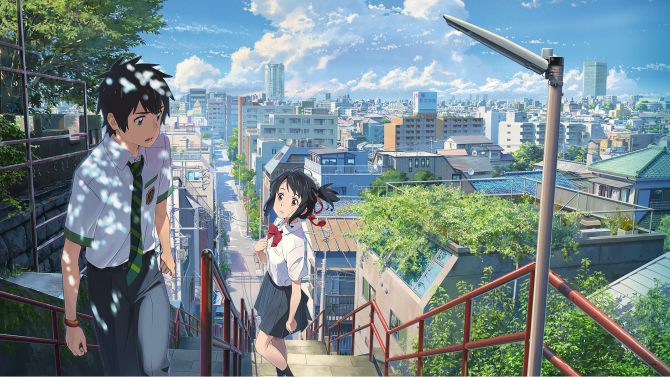The major PR push for Your Name is that it was and remains a smash hit in Japan, making 15 billion yen ($170 million) at the box office over only 10 weeks, a base stat only made more impressive given that it’s a major Japanese animation not from Studio Ghibli.
Now that’s definitely worth shouting about and goes some way to quantifying its wholly different approach, but fiscal success and foreign popularity doesn’t quite do the film justice.
I knew nothing more than what’s in that first paragraph going in, and in many ways the film’s themes of discovery are stronger when you like the protagonists are plunging fearlessly into the unknown, but in the shortest form possible, this is a body-swap relationship drama, with two teenagers – one a rural girl dreaming of the big city, the other a Tokyo lad with blokey repression – finding their lives inexplicably linked by repeated days in each other’s skin.
In a sub-genre is typified by knockabout comedies like Freaky Friday and the concluding moral is always a variation on the incredibly literal “appreciate what it’s like in other people’s shoes”, Your Name really stands out; this is the exploration of how you would reasonably deal with such a shocking yet simple trick (yes, the translated guy’s instinctive first action is to go for the breasts) and the long-term realities of it.
It isn’t just wallowing in a tantalising “What if?” scenario, however. A once-in-a-millennia comet hangs in the sky throughout, a vibrant hint of hard sci-fi whose weirdness is reflected in an unconventional story structure; through montage, flashback, dreams and more, the film transforms into a genre straddling thriller drama. Ostensibly this would be aimed at teens, dealing as it does with finding a place in your own body and the wider world, but these inflections make its appeal span wider.
There’s a myriad of readings of what later plot turns represent that will no doubt be thoroughly dissected in the wake of the film’s success, but what stood out most for me was the tangible, far-reaching impact of intimate love and the notion of an indescribable, preexisting connection with those who have an impact on your life.
What I’m saying with all that is that Your Name is wonderful, and it’s realised in the most apt way. We open seeing the comet skirting along the atmosphere, setting a visual high bar. Tokyo is overwhelming yet understandable; rural Itomori idyllic yet flawed; and the more magical moments are noticeably more unhinged than what we saw mere weeks ago in Doctor Strange.
It’s all superbly put together, with some of the most noticeable yet effective editing I’ve seen in an animation, often scored to Japanese pop songs which, while unconventional, fits the youthful focus and strange mood. The songs do pose a subtitling problem, as do moments with dialogue and Japanese text where descriptions clash (at one point even overlapping), and indeed it’s in the comprehension of minutiae where the film stumbles, with some isolated beats a little impenetrable. Not in any horrendous way, but there are spots.
Your Name is a highly recommended animated delight, along with When Marnie Was There, Zootopia, Kubo and Ethel & Ernest marking 2016 out as a banner year for cross-generational animation. Go to see what all the financial fuss is about, but stay for the artistic glory.
